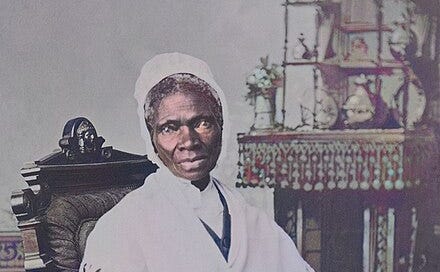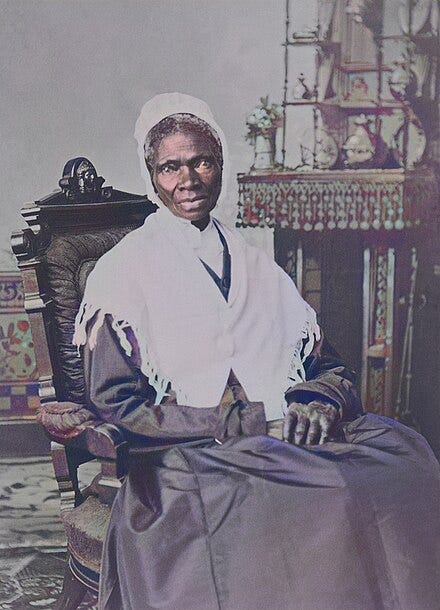Today In Black History
Sojourner Truth, Civil and Women's Rights Activist and Author
Issue #528 Today In Black History, Monday, March 11, 2024
Today’s Black History WOW!
Sojourner Truth was born Isabella Baumfree and was an American abolitionist and activist for African-American civil rights, women's rights, and alcohol temperance.
Her father was an enslaved man captured from present-day Ghana, while her mother – nicknamed "Mau-Mau Bet" – was the daughter of Africans captured from Guinea and sold into slavery. Truth was born into slavery in Dutch-speaking Swartekill, New York, and her enslavers bought and sold Truth four times and subjected her to harsh physical labor and violent punishments.
In her teens, Truth was united with another enslaved man with whom she had five children, beginning in 1815. In 1827—a year before New York’s law freeing enslaved people was to take effect—Truth ran away with her infant Sophia to a nearby abolitionist family.
The family bought her freedom for twenty dollars and helped Truth successfully sue for the return of her five-year-old son Peter, who was illegally sold into slavery in Alabama. After going to court to recover her son in 1828, she became the first Black woman to win such a case against a white man.
She gave herself the name Sojourner Truth in 1843 after she became convinced that God had called her to leave the city and go into the countryside "testifying to the hope that was in her." Her best-known speech was delivered extemporaneously, in 1851, at the Ohio Women's Rights Convention in Akron, Ohio. In it, she challenged prevailing notions of racial and gender inferiority and inequality by reminding listeners of her combined strength (Truth was nearly six feet tall) and female status.
The speech became widely known during the Civil War by the title "Ain't I a Woman?", a variation of the original speech that was published in 1863 as being spoken in a stereotypical Black dialect. This variation was written by a white woman who thought all Black people spoke like that.
Actually, Sojourner Truth's first language was Dutch and she spoke English with a Dutch accent and never with a stereotypical dialect.
As an itinerant preacher, Truth met abolitionists William Lloyd Garrison and Frederick Douglass. Garrison’s anti-slavery organization encouraged Truth to give speeches about the evils of slavery. She never learned to read or write. In 1850, she dictated what would become her autobiography—The Narrative of Sojourner Truth—to Olive Gilbert, who assisted in its publication. Truth survived on sales of the book, which also brought her national recognition. She met women’s rights activists, including Elizabeth Cady Stanton and Susan B. Anthony, as well as temperance advocates—both causes she quickly championed.
Truth ultimately split with Douglass, who believed suffrage for formerly enslaved men should come before women’s suffrage; she thought both should occur simultaneously.
During the 1850’s, Truth settled in Battle Creek, Michigan, where three of her daughters lived. She continued speaking nationally and helped enslaved people escape to freedom. When the Civil War started, Truth urged young men to join the Union cause and organized supplies for Black troops.
After the war, she was honored with an invitation to the White House and became involved with the Freedmen’s Bureau, helping the formerly enslaved find jobs and build new lives. While in Washington, DC, she lobbied against segregation, and in the mid-1860s, when a streetcar conductor tried to violently block her from riding, she ensured his arrest and won her subsequent case.
In the late 1860s, she collected thousands of signatures on a petition to provide formerly enslaved people with land, though Congress never took action. Nearly blind and deaf towards the end of her life, Truth spent her final years in Battle Creek, Michigan, and died on November 26, 1883.
Today In Black History
- In 1789, Black mathematician, astronomer, and almanac author Benjamin Banneker worked with architect Pierre Charles L’Enfant to begin laying out the streets of Washington, D.C.
- In 1861, the Confederate Congress, meeting in Montgomery, Alabama, adopted a constitution that declared that the passage of any law denying or impairing the right of property in Negro slaves was prohibited.
- In 1874, Frederick Douglass was elected president of the Freedmen’s Bank and Trust.
- The “Comments” feature has been disabled. Instead, let’s discuss these facts in our community on Substack Notes. You can also read other Substack publications without subscribing to them when you join Notes.
This post is free to read/listen to for three days after publication. To have 365 24/7 access to all our posts and podcast episodes and financially support “We Are Speaking” for no more than $5 per month, please subscribe at the paid level. You will receive a 7-day FREE trial!






